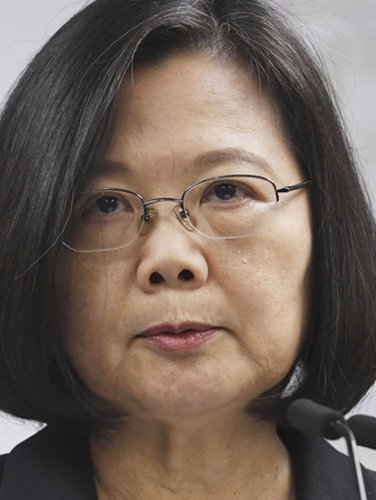HOME >> CHINA
Taiwan’s DPP phone primary marred by low participation
By Sun Haoran Source:Global Times Published: 2019/6/16 10:03:39

Tsai Ing-wen announced her resignation as the chair of the Democratic Progressive Party late Saturday, to take responsibility for the party's performance in Taiwan's local elections. Photo: VCG
The Democratic Progressive Party (DPP) inner-party primary result is not a representation of the will of the people among those on the island since participation was extremely low, said a Chinese mainland expert on Taiwan studies.
The DPP announced on Thursday the regional leader of the island, Tsai Ing-wen, had won the DPP primary poll by nearly 35.7 percent, defeating former head of the Taiwan administrative authority Lai Ching-te by 8.2 percentage points, chinatimes.com reported on Thursday.
Although Tsai still needs approval from the DPP's executive committee to become the official candidate, her nomination is almost certain to be ratified for the upcoming 2020 election in January.
According to the announcement, the result was determined by a public opinion phone survey that included 16,051 respondents, and involved 8,056 calls to landlines, and 7,995 calls to mobile phones.
"The sample was really small compared to the population in Taiwan [about 23 million], and Tsai only got less than 36 percent among them to win the primary poll. This shows the DPP has really low support among the people on the island," said Li Fei, a professor with the Taiwan Research Institute at Xiamen University, to the Global Times on Thursday.
Voters on the island are not interested in participating in the "election," especially after the poor performance from the DPP during the past four years, said Li.
According to the Beijing Daily, Tsai manipulated public opinion by including cellphone users into the primary polls and postponing the poll date that was originally scheduled for late March, to secure her party nomination.
Earlier this week, Tsai showed support on her Facebook account for the violent demonstrations in Hong Kong, which harm city's stability.
The DPP is good at using Taiwan's so-called "democracy" as a tool for elections, Li said.
Tsai has been assertive against the Chinese mainland with her strong pro-separation stance since she won the 2016 election, which brought tension and uncertainty to Cross-Straits relations.